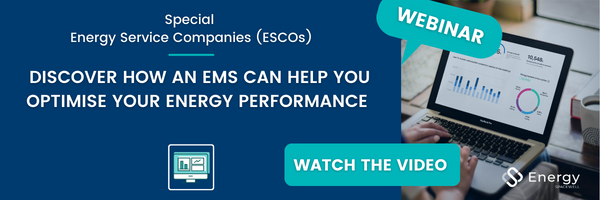Artificial intelligence is everywhere in our lives, from powering search engines, through product recommendations, to phone unlocking by facial recognition…So how can artificial intelligence be defined? “In its simplest form, artificial intelligence is a field that combines computer science and robust datasets to enable problem-solving” (IBM).
This concept and its use are becoming increasingly popular in the field of energy management, in spite of some doubts and misconceptions. Indeed, while some professionals are still sceptical about AI’s effectiveness, others may be reluctant to share their data or are still hesitant to take the leap because it seems too complex.
The use of Artificial Intelligence in the energy sector is very diverse and can be applied to any industry. There is an enormous potential for Energy Services Companies to benefit from technology and help clients achieve their energy efficiency goals. But how can AI be leveraged to provide the right customer with the right information at the right time so that they make more enlightened decisions that will directly affect costs?
In this article, we will talk about how AI is (re)shaping the energy sector and how ESCOs can benefit from its use. So… if you still have some reservations, or if you are interested in Artificial Intelligence and want to know more, keep on reading!
How is Artificial Intelligence Shaping the Energy Industry?
Artificial Intelligence Contribution to Energy Transition
Artificial intelligence (AI) has tremendous potential to both accelerate and support the global energy transition as it can be widely implemented across the energy value chain. It can act as a smart layer in many implementations to detect and identify patterns, enhance system performance and forecast the outcome of complex situations.
In addition, the global energy system, reinforced by the current energy crisis and the global awareness of climate issues is experiencing a radical transformation. It will in the coming decades continue to be further decarbonised, digitalised and decentralised. This is why using AI is more meaningful than ever and unfortunately, companies that are not ready to make this transition will pay heavy consequences…There are already many companies that can benefit from the power of AI, and you can be one of them too!
Today, this particular technology has already demonstrated its worth in the renewable energy sector by making significant progress in different areas…and it is just the beginning.
“In energy, we are only seeing the beginning of what AI can do to speed up the transition to the low-emissions, ultra-efficient and interconnected energy systems we need tomorrow,” added Roberto Bocca, Head of Energy, World Economic Forum.
Energy Efficiency Initiatives: a Pressure borne by ESCOs
Energy service companies (ESCOs), despite being in operation for quite some time, have grown in popularity in recent years as an optimal channel to reach new energy efficiency standards and objectives. The global ESCO market, valued at $25.2 billion in 2020 is expected to reach $49.6 billion by 2030 (Allied Market Research).
Therefore, ESCOs are often the ones that feel the brunt of energy efficiency measures and encounter some challenges when trying to apply energy efficiency measures, as they are the first in line. Some of the reasons, among others can include:
- Multivendour automation systems, running in silos, which complicate and delay Energy Service Company’s project phases/cycles;
- Failure to monitor and gather detailed real-time data (granular data) on building performance and improvement actions…
- ….or Gathering too much data but not being able to process it;
- Lack of a data-based focus to proactively assess and adjust performance;
- Failure to produce actionable insights that can lead to better decision-making and better action before it becomes too late.
As a consequence, these kinds of challenges might make it hard for you, as an Energy Service Company to run and scale up several projects at the same time, preventing some of your large clients from upgrading their regular business practices and thus, reaching their ESG objectives.
The future of Energy Management for ESCOs
1. Data Digitalisation to increase your competitiveness
As in other fields, the trend is towards personalisation and the energy sector is no exception. As ESCOs have a lot of data to manage and many still do it manually, implementing an energy management system like the Dexma Platform will save you a lot of time. Indeed, some of the advantages for ESCOs to use AI include data storage, handling and management in a faster and more cost-efficient way. In addition, if you were to decide to implement innovative technologies and new methods of operation, you would become more competitive and relevant in a highly competitive and ever increasingly volatile market.
2. Predictive Analytics to drive better decision making
Predictive Analytics or Forecasting will help you answer the question “What might happen in the future?”
With well-aware clients who always want to pay less for high-quality service while getting more choice and transparency, relying on advanced technologies (such as machine learning, and algorithms) and analytics will help you meet their expectations.
You can glean new insights to streamline decision-making, sustain automated processes and enhance the customer experience with business intelligence tools, such as the Dexma Platform. Indeed, forecasting with predictive analytics draws on both historical data collected in your client’s equipment and our energy database to find key linkages that will enhance performance, lower operating costs and extend the life of the equipment of your client. If you are interested in getting a deeper understanding of this topic, read our related blog post about machine learning.
3. Resource Management to reduce your costs
Once Predictive Analytics methods have been put in place, Energy Services Companies will automatically realise they will benefit from more efficient resource management, thanks to artificial intelligence. Indeed, you will now be able to anticipate demand accurately, allocate your resources better, foresee any problems that might arise and finally, save resources whenever possible. Doing so will lead to a reduction in your costs and in an increase in customer satisfaction.
4. AI to increase customer engagement
It is true that, unlike other sectors, the energy field is rather late in catalysing and realising the potential that exists to engage its customers. Indeed, often this is mainly due to the lack of knowledge, channels, best practices or even tools used. As mentioned earlier, ESCOs have access to a massive volume of data that they process on a daily basis. Therefore, if this data remains siloed, it will certainly lead to major missed opportunities.
In addition, today’s customers expect a highly personalised user experience. Therefore, as an ESCO, you need to leverage artificial intelligence to anticipate potential problems that could arise and affect your experience, taking a proactive and pragmatic approach.
For example, if a leak were to occur at one of your customers’ facilities, they should immediately receive a personalised phone call or a personalised alert on their app. The Dexma platform can detect anomalies because the solution is constantly learning from your data to distinguish expected from atypical behaviour. In this sense, you’ll be able to find instances of unexpected consumption, and quantify the impact on your customers’ energy efficiency, while monitoring thousands of sites at once, without compromising on customisation or attention to detail. In addition, the AI algorithms adjust their baselines taking into account local holidays and weather conditions, so your anomalies are much more accurate.
Another way to use artificial intelligence to increase customer engagement is to implement a smart solution, such as the Dexma platform, with a single dashboard interface, presenting everything you need to know in one place and resulting in a gain of time. Scattered information can lead to frustration and reduced efficiency and therefore increase churn.
Finally, turning your service into sales thanks to AI can be beneficial to your ESCO. In most Energy Services Companies, Sales and Service are two distinct, operating separately. This greatly impacts your company’s efficiency and effectiveness. Artificial Intelligence will allow for a connection between the two departments by offering upsell options, targeted discounts, blended services and an improved sales department experience. Using AI, they can pinpoint a formerly unidentified need or a more appropriate product offering, enabling ESCOs to add further value to their customer, and thus reducing churn rate and increasing customer loyalty.
5. Virtual Audits to scale clean energy
It’s no surprise, and we are not teaching you anything… virtual energy audits powered by Artificial Intelligence have been a mainstay of ESCOs’ clean energy programmes for years now. Virtual Energy Audits are a great way to identify your customers’ consumption patterns and identify opportunities for them to save more energy and thus lower costs and carbon footprint. Dexma allows you to non-intrusively detect potential energy savings, automatically report to various stakeholders, configure all your sites and check the reliability of bulk data.
Leading ESCOs are shifting their paradigms and improving their operational methods to gain a competitive advantage and provide their clients with more options to reach energy efficiency. Are you ready to take advantage of Artificial Intelligence to do it too?
We are used to working with ESCOs: as an Energy Management System (EMS), the Dexma Platform will allow you to pre-audit prospect users and inform your customers about their energy consumption with just a click….but not only. Discover here the range of related features you will benefit from.
The full value and advantages of AI for energy management only arise when the technology is combined with human expertise. Therefore, don’t hesitate to get in touch with our energy experts to discover the potential of energy management technologies.




